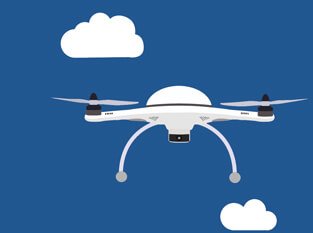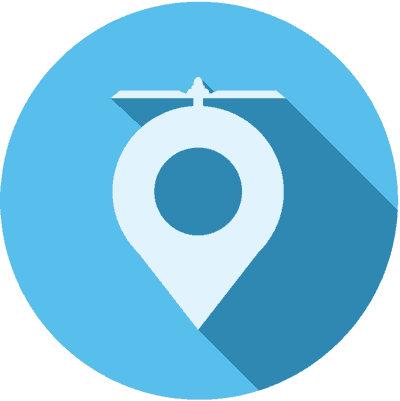Florida Drone Registration
FAA Drone Registration Type
Please select the type of drone registration you require. If you will only operate your UAS for recreation & hobby, select the Hobby & Recreation Drone Registration. If you will charge for services or the use of the drone will be used in conjunction with for-profit services you must select Business & Commercial Drone Registration.


Florida Hobby & Recreation Drone Registration
This drone registration type is for those who fly model aircraft, drone, UAS solely for recreation, and not for commercial or other non-hobby purposes.
Drone Registration will be valid for a period of three years.

Florida Business & Commercial Drone Registration
This drone registration type is for those who fly for commercial, government or other non-hobby purposes.
Non-model aircraft will receive a unique Certificate of Aircraft Registration for each aircraft.
Drone Registration will be valid for a period of three years.
Florida Information
- Population:
- 19.89 million (2014)
- Capital:
- Tallahassee
- Governor:
- Rick Scott (R)
Florida Department of Transportation Website Drone Search
Florida Additional Drone Information:
Orlando Florida:
A Drone UAS Ordinance 12-7-2016 Orlando Florida new ordinance passed by city officials; drone use is now restricted within 500 feet of city-owned parks, schools and venues, such as the Amway Center, Camping World Stadium and Harry P. Leu Gardens. Drones are also restricted within 500 feet of gatherings with more than 1,000 people.
A permit is required to fly a drone in these areas, which cost $20 per flight or $150 annually.
Those caught in violation of the ordinance will have to pay fines between $200 and $400.
Anyone who operates a drone under the influence of alcohol or drugs also runs the risk of arrest or jail time, on top of the fines for violating the ordinance.
Opponents of the ordinance say that the federal government already has drone regulations and that this will discourage the sale and recreational use of the machines.
City officials say that they want to encourage drone use in the city, but also make sure that popular public places are kept safe for citizens and tourists.
Helpful PDF InfoGraphic of Florida’s Drone Regulations
Download Florida’s Drone Regulations InfoGraphic
State Regulations
FDOT regulates airports, promotes their development, and protects the approaches to Florida’s aviation facilities by Florida Statute (F.S.). Independent of FDOT, UAS operator rules are provided in Chapter 934.50, F.S., and regulate law enforcement, civil, business, and personal uses, as well as the liabilities associated with them.
Specifically, Chapter 934.50(3), F.S., prohibits the use of UAS for the following purposes:
- Use of UAS by law enforcement to gather evidence or other information (934.50(3)(a), F.S.)
- Use of UAS to conduct surveillance of privately owned real property or the owner (934.50(3)(b), F.S.)
Additionally, under Chapter 934.50(4), F.S., UAS are allowed for the following uses:
- To counter a terrorist threat (934.50(4)(a), F.S.)
- Law enforcement activity with a warrant (934.50(4)(b), F.S.)
- For law enforcement in particular circumstances when swift action is needed (934.50(4)(c), F.S.)
- A business or profession may use a drone to conduct reasonable tasks within the scope of that business’ license (934.50(4)(d), F.S.)
- For property appraisals (934.50(4)(e), F.S.)
- To capture images of electric, water, or natural gas facilities (934.50(4)(f), F.S.)
- For aerial mapping in compliance with FAA regulations (934.50(4)(g), F.S.)
- To deliver cargo in compliance with FAA regulations (934.50(4)(h), F.S.)
- To capture images necessary for the safe operation or navigation of a UAS, when used for purposes allowed under federal and Florida law (934.50(4)(i), F.S.)
Chapter 934.50 of Florida Statutes can be viewed HERE.
Airport’s Responsibility
An airport is responsible for ensuring the safety of airport facilities and for managing airport lands, buildings, and infrastructure. Airports should understand the rules and regulations related to UAS operations at and in the vicinity of their airport and coordinate with the FAA and FDOT to ensure the safety of airport operations. Airports should notify local law enforcement and the FAA in the event of an unauthorized UAS is used in close proximity to the airport.
Local Law Enforcement’s Responsibility
Local law enforcement is responsible for enforcing the laws and regulations as they relate to UAS operation. Enforcement is limited to the legal boundaries of each law enforcement agency. If a UAS operator is suspected of breaking FAA regulations, local Law Enforcement Agencies (LEA) are encouraged to conduct interviews, document the scene, collect any evidence, and notify the appropriate FAA Regional Operation Center. In addition to federal regulation, LEAs should be familiar with state (934.50, F.S.) and local regulations that may pertain to UAS operation within their jurisdiction.
Pilot’s Responsibility
Pilots are in charge of operating aircraft in a safe manner and are ultimately responsible for the route and operation of aircraft in the sky and on the ground. Pilots should understand the rules and regulations of UAS and report any improper use or operation. Please utilize the FAA’s “I Fly Safe” UAS safety checklist here.
Community Responsibility
The community should understand the rules and regulations regarding airports and aircraft. Knowing the roles and responsibilities of those involved in aviation (the FAA, the airports, airlines, pilots, etc.) and how to contact the appropriate entity will help ensure the safe and effective operations of UAS. Community members should know the locations of airports in their area and report any suspicious activity to the appropriate agencies.
The 2015 FDOT Airport Directory lists the owner, manager, and contact information for all public and private use facilities in Florida. The link to download the Directory is here. A map of Florida’s public use aviation facilities can be found here.
A map of Florida’s aviation facilities can be found at http://www.fdot.gov/aviation/facilitymap.shtm.
Helpful Contact Information
FAA Southern Regional Operation Center
(ROC): (404) 305-5180 or [email protected]
FAA Flight Standards Districts Offices
(service areas can be identified here):
- South Florida: (954) 641-6000
- Orlando: (407) 812-7700
- Tampa: (813) 287-4900
- NW Florida (panhandle west of and including Gulf, Calhoun, and Jackson Counties): (205) 876-1300
FAA’s Law Enforcement Assistance Program Office
(202) 267-4641 or (202) 267-9411
FDOT Aviation and Spaceports Central Office:
(850) 414-4500
Florida Department of Law Enforcement Regional Offices: here.
The FAA asks you to remember these rules when you fly:
• Always fly below 400 feet altitude.
• Always keep your unmanned aircraft in sight at all times.
• Never fly near manned aircraft, especially near airports.
• Never fly within 5 miles of an airport.
• Never fly over groups of people, stadiums or sporting events.
• Never fly near emergency response efforts.
• Never fly under the influence of alcohol or drugs.
• Always be aware of FAA airspace Temporary Flight Restrictions.
To learn more about the Drone Registration Basics please visit here.